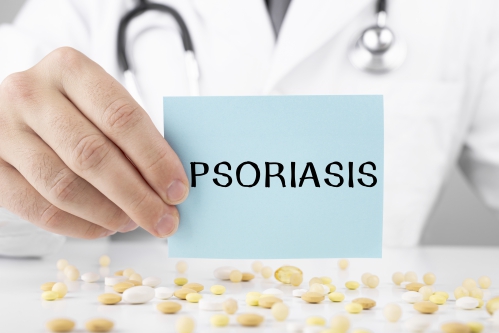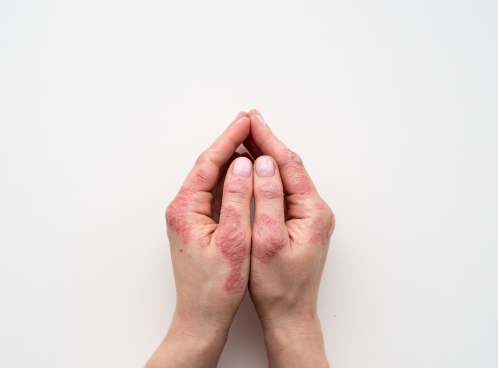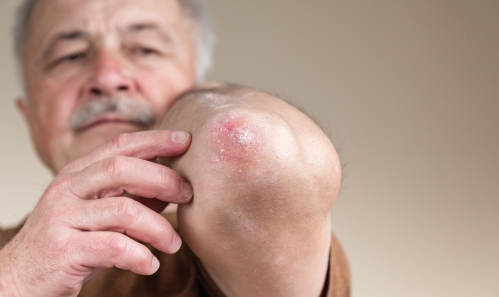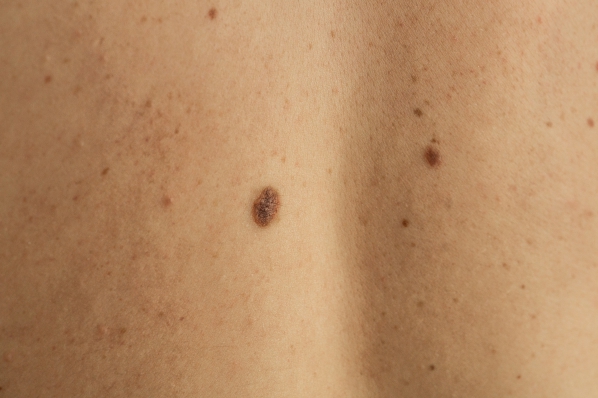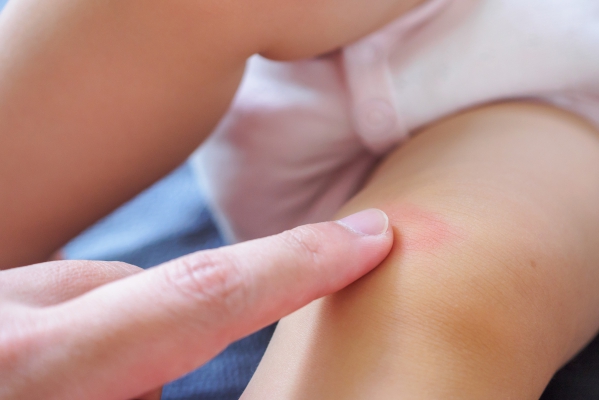What is Psoriasis?
that occurs when the cells found in your skin, called keratinocytes, proliferate too much causing an accumulation of skin cells. This accumulation manifests as white plaques on the skin. It can arise in several areas of the body. Despite having a lot of stigma attached to it, it is a non-contagious skin condition. However, it can also affect other system in your body in certain cases.
Psoriasis, skin disease
The condition usually wax and wane, meaning that periods of resolution alternate with flares. It can be related to a number of environmental factors such as stressful life events and infections. Psoriasis is a condition that can have a great impact on one’s quality of life. There are different types of psoriasis classified according to their presentation and location.
According to the National Institute of Health (NIH), around 2.2% of people in the United States has psoriasis while 2-3% of people worldwide has the condition. It is a disease that can arise at any age but is more common in people above 50 years. It has also been observed that it is more common in women compared to men. The treatment of psoriasis depends on the severity and extent of the condition.
Causes and risk factors of psoriasis
Psoriasis occurs when keratinocytes divide and proliferate excessively. There are many factors that can contribute to the development of psoriasis. Some studies has shown that there may be the influence of genetics and your immune system. Factors that can put you more at risk of having psoriasis may include:

- Stress
- Triggering factors such as cold, trauma or infections
- Alcohol and smoking
- Medications such as aspirin, lithium and beta-blockers
- Inheritance of genes associated with psoriasis
- Family history of psoriasis
- Sudden withdrawal from corticosteroids
Signs and symptoms of psoriasis
Psoriasis can be classified according to the type, location and presentation. The different types of psoriasis are as follows:
- Plaque psoriasis: This is the most common type of psoriasis which presents as whitish plaques with silvery scales. The most common sites include the elbows, knees, lower back and scalp.
- Guttate psoriasis: This is a type that occurs mostly in young people. It presents as small drop-shaped scaly lesions on the trunk or extremities. It is usually preceded by a throat infection.
- Nail psoriasis: When psoriasis affects the nails, it is referred to as nail psoriasis. It can affect both fingernails and toenails. The nails change in colour and have pits on their surface. With time, the nails may even separate from the nail bed.
- Inverse psoriasis: This type of psoriasis is located in skin folds. It presents as red patches of skin which can get worse with sweating.
- Pustular psoriasis: This is a rare form of psoriasis that manifests as small pus-filled lesions.
- Erythrodermic psoriasis: This form of psoriasis manifests as a peeling and itchy rash with a burning sensation.
- Psoriatic arthritis: This arises when psoriasis presents with joint involvement. It presents as a swollen and painful joint. It results in progressive joint damage which can lead to permanent loss of function.

In general, common symptoms for psoriasis include the following:
- Red skin patches with overlying white-silvery scales
- Pinpoint bleeding when lesion is scratched or scraped
- Itchiness
- Burning sensation
- Changes in nails such as pitting or thickening
In some cases, psoriasis can even involve the eyes. Inflammation of the eyelids may occur presenting as swollen and red eyelids with overlying psoriatic plaques.
Making a diagnosis
The diagnosis of psoriasis is usually clinical. This means that your doctor will first begin by taking a good history from you followed by a physical examination. Your doctor will ask you several questions on your condition including:
- How has the disease progressed with time?
- Was the onset sudden or progressive?
- Have you had any recent throat infection?
- Have you recently had any vaccines or used antimalarial drugs?
- Is the skin condition associated with pain?
- Is it itchy?
- Do you have any joint pain?
The physical examination findings will depend on the type of psoriasis you have. Your doctor will examine all the site of predilection of psoriasis, your joints and your eyes.

Since psoriasis can present as psoriatic arthritis, it is important to rule out other joint diseases that can present in a similar way. This can be achieved by performing the following tests:
- Rheumatoid factor
- Erythrocyte sedimentation rate (ESR)
- Uric acid level
- Examination of fluid collected from pustules
The diagnosis of psoriasis is mostly made based on a good clinical history and physical examination. Skin biopsy, which is a procedure whereby a sample of your skin is taken for laboratory examination, is rarely required. It is only requested if the lesion are difficult to recognize.
Treatment of Psoriasis
The goal of the treatment of psoriasis is to prevent skin cells from proliferating at such a fast rate and remove scales. There are several treatment options for psoriasis including:
- Moisturizer: People with psoriasis tend to have dry skin. Moisturizing daily with petrolatum jelly for example can be very helpful. It is an inexpensive treatment with has a lot of benefits. It is recommended to moisturise immediately after your bath or shower to decrease itching sensation and pain.
- Tar: Tar preparations are available for the treatment of psoriasis. It works by decreasing the amount of scales on the skin as well as itchiness and inflammation. It is available in various forms namely; oil, cream and shampoo.
- Corticosteroids: Corticosteroids are anti-inflammatory medications that can be used on psoriatic lesions to decrease the amount of inflammation present. They are available in the form of shampoos, gels, creams, lotions and ointments. They are also available in the mild or strong form. The mild form of corticosteroids can be used on the face. On the other hand, strong forms of corticosteroids should be avoided on the face and should not be used on a long term. Oral steroids medications are reserved for persistent psoriatic plaques.
- Vitamin D analogues: These are synthetic forms of vitamin D which can be used alone or in conjunction with corticosteroids. These medications work by decreasing the rate of cell growth.
- Retinoids: Retinoids work by triggering death of cells making way for new cell growing underneath. This decreased the formation of scales that usually arise due to excessive proliferation of cells. A common side effect of retinoids include increased sensitivity to sunlight.
- Calcineurin inhibitors: These medications work by decreasing inflammation as well as plaque build-up on your skin. They can be used as an alternative if steroids or retinoids are too irritating.
- Light therapy: If you have psoriasis, it is recommended to have a daily dose of sunlight exposure every day. This has been shown to improve psoriasis. Controlled artificial light sources can also be used to treat psoriasis.
- Immunosuppressant: This class of drug is generally reserved for severe forms of psoriasis. Some examples include methotrexate and cyclosporine. However, intake of these medications should be well monitored through regular blood tests as they can be associated with serious side effects.


Complications of Psoriasis
Psoriasis, in some cases, can lead to several complications including:
- Secondary infections due to the immunosuppressive treatments
- Increased risk of cardiovascular diseases
- Joint involvement (psoriatic arthritis)
- Heart valves prolapse
- Inflammatory bowel disease
- Increased risk of cancer, for example; lymphoma
Prognosis
Despite being a benign condition, it is a chronic condition with a waxing and waning pattern. It sometimes can have severe exacerbations which can be resistant to treatment. In around 10% of people, the disease may progress to start involving joints. If the disease is mild, there is no increased risk of death. However, having the severe form of the disease can decrease your life expectancy. Psoriasis is a condition that can significantly affect one’s quality of life. It has been shown to cause psychological and physical distress comparable to that of other chronic illnesses such as cancer and depression.
Source:
Habashy, J., 2019. Psoriasis.
Parveen, K. and Michael, C., 2017. Kumar & Clarks Clinical Medicine. 9th ed. The Netherlands: ELSEVIER.
